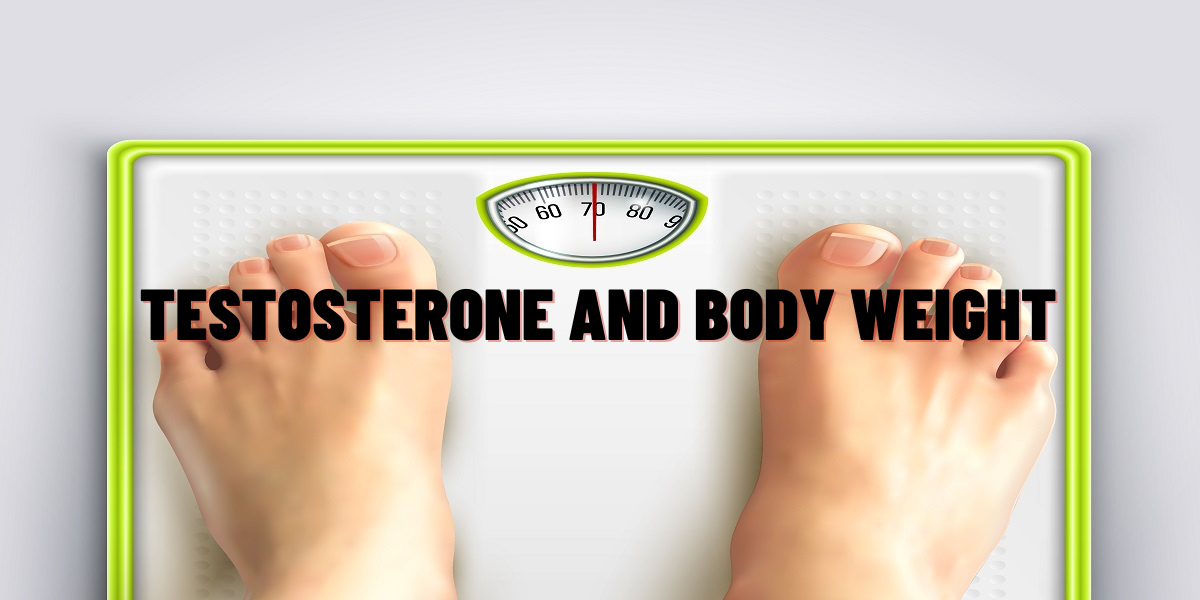Impact Of Testosterone On Body Weight: Things To Know

Testosterone is often one of the most ignored elements when it comes to melting off excessive weight. However, it is important to understand that it shares a very close and intrinsic relationship with body weight.
Aside from the obvious masculine characteristics like facial hair and low-pitch voice, testosterone is also responsible for building stronger muscles and increasing bone density in men which are critical in testosterone synthesis. A healthy testosterone profile will, in return, help keep you fit by aiding body fat reduction, thus giving you the desired body you are working so hard for.
All that said, if you are planning to indulge in some serious weight-loss routine, then do not forget to work on maintaining your testosterone levels. In fact, this should be one of your top game plans to get that attractive waistline.
This article will take you through things everyone should know about testosterone and body weight.
Overview Of Key Facts
What Does Testosterone Do To Body Weight
Testosterone is a versatile hormone controlling various bodily aspects at the same time. It not only impacts the sexual health in men but also plays a major role in overall body functioning by influencing fat distribution, building muscles, and bones, or even mental health. Here’s how-
Testosterone On Fat Accumulation
Testosterone determines the way the fat is going to be stored in the body. More so, the amount of fat that the body reserves. Speaking of fat distribution, you should know that it is the testosterone level because of which the location of fat accumulation varies between a man’s and a woman’s body.
For example, lower levels of testosterone increase belly and abdominal fat in men increasing their weight. Apart from that, it can also pose difficulty in cutting that fat off easily, eventually leading to health problems due to being overweight.
The fat cells in the body release a secretion called aromatase which manipulates with testosterone causing hormonal imbalance. It’s not unknown that hormonal imbalances are directly related to weight gain and stubborn fat that is challenging to shed.
Muscles Gain

One of the major elements behind bulking up and fortifying muscles is the testosterone hormone. Muscle mass has a significant impact on maintaining the weight of your body. Meaning- the higher the muscle mass, the more calories you dissolve because the muscles need a lot of calories in order to maintain themselves.
When you work out, there is an increase in Testosterone release. The hormone then interacts with the muscles, activates the growth hormone, and increases cell growth enabling the muscles to pump up. Higher levels of testosterone, thus, also help repair damaged tissues contributing to faster healing of any injury.
Effect On Mental Health
Various studies and research have shown that testosterone has a significant association with brain functioning and thus, has an influence on mental health. Reduction in this hormone level can adversely affect the behavior of the brain. This can hamper the emotional well-being of the brain causing anxiety, low mood, depression, fatigue, lack of concentration, and motivation to name a few.
By now you know how testosterone and body weight are interrelated and how they can affect our bodies in different ways. But it is also important to understand what causes testosterone levels to go down and here’s what we found-
Factors Behind Low Testosterone Production
Like any other hormone, the levels of testosterone keep fluctuating all through your life. There is a combination of factors playing behind it like age, genes, lifestyle, environment you live in, and various social influences. Because of these, a person may experience an increase in the production at one point in life while at another phase the hormone may dip down prominently.
If you are lucky, there can be some solutions that can help regain the normal production of testosterone but that again depends on the cause. In some cases, it may not be treatable and you may need to accept it the way it is. That said, let’s dig a bit deeper into the various underlying factors that cause a decline in testosterone production:
Aging
One of the most common causes of low testosterone is aging. The level of this hormone is usually at its best at the adolescence stage (when a man reaches puberty) through the teenage. As you grow older, especially from 30 on, there can be a gradual decline in production. However, an increase in age is often backed by other health and medical conditions like weight gain, diabetes, etc. which can take a toll on testosterone production. That brings us to the next factor.
Health Conditions
It goes without saying that good health keeps all the hormones functioning normally. Sadly, certain ailments are not under our control. Men experience a decline in testosterone production if they suffer from testicular conditions, ailments related to the nervous system, pituitary gland, physical injuries, diabetes, cancer, or even some infections.
Obesity or excessive body weight is another reason behind the drop in hormone production just as it works vice versa. A study has shown that for every 1 unit increase in Body Mass Index (BMI), there is a 2% drop in testosterone generation.
Genetic Abnormalities
Oftentimes, genetic conditions like Klinefelter Syndrome can lead to low testosterone production. This is not something that one inherits, but a genetic error causing the deformity. Sometimes a testosterone boost or a replacement can make the condition better but it depends on the individual case.
Steroid And Medication
Certain medications, especially steroids that are used to treat other health conditions can have an adverse effect on testosterone. It can happen at any stage irrespective of age. While in some cases, you may regain back healthy production after the medication stops, in others, it can be a long-term issue.
Improper Sleep
The quality of sleep is yet another major factor influencing testosterone production. Sleep in general is a significant component in physical and mental well-being. Constant irregularities in sleep or less sleep can lead to many health problems including a dip in testosterone production.
Side Effects Of Low Testosterone
A dip in the production of testosterone comes with many side effects. Some of the most common ones that men face are:
Increase In Body Weight

While there can be several factors behind sudden gain in weight, insufficient testosterone can be one of the major ones as it helps in metabolism. If you notice that you are constantly gaining weight even after diet programs and working out, then you may want to check your hormone level.
Difficulty In Focussing
If you find it restless and hard to concentrate on your work or often become forgetful, then low secretion of testosterone can be the reason behind it. Proper diagnosis can help find out the actual reason behind it.
Lack Of Energy
Well, feeling exhausted after a long day’s work can be normal. However, if you are tired all the time despite taking ample amounts of rest, then a decline in testosterone production can be the reason. Testosterone regulates the metabolism which in turn releases energy from the food.
Anxiety And Depression

Changes in mood are yet another sign of having a low level of testosterone. While it may not directly affect the mood, various health problems like gain in weight, low sperm production, erectile dysfunction, etc. can affect mental health. Therefore, anxiety and depression are often associated with people having low testosterone.
How To Bring The Testosterone Level Up
Some of the reliable ways that can help in increasing testosterone production in your body include:
Healthy Diet

If you are aiming to increase testosterone in your body, then the very first thing you need to do is redo your diet chart. Cut down all the food that are high in refined sugar, saturated fats and include fruits and vegetables, leafy greens, fish, etc. You need to intake food that is rich in nutrients like Vitamin B6, C, potassium, magnesium, K, D, and bromelain in order to regulate testosterone.
Powerlifting Exercises
Weight workouts will help you build muscle mass, strengthen the muscles and elevate the tolerance level. Testosterone is directly proportional to muscle mass building which means more muscle mass leads to more release of the hormone. Testosterone tends to release more after the workout session or while doing it.
Testosterone Supplements
While trying more natural ways like regular exercise and a healthy diet is the best way to resolve low testosterone problems, oftentimes it may not be enough. This depends on the individual body and the reason behind reduced hormone release. Taking reliable testosterone supplements that are certified, organic, and made with natural herbs will likely tackle the problem.
Improving Sleep Quality
In today’s busy lifestyle, many people tend to compromise on their sleep. Poor quality sleep causes stress which can not only affect the production of testosterone but also the overall health of a person. Therefore, proper sleep management and improving the quality of sleep is one of the ways you can reduce stress and thus regulate your testosterone.
When Should You Seek Professional Help
It is always best to see a doctor from the very time you start experiencing the symptoms of low testosterone. Consulting a professional on time can prevent the situation from aggravating and get you back on track sooner. Aside from that, experts can diagnose the actual cause behind the dip in testosterone which is helpful in treating the issue from the root level.
Conclusion
A good testosterone level is an indication of good health. Testosterone is directly associated with weight gain and a reduction in the release of this hormone increases the weight. Regular workouts, muscle development and strengthening, and a healthy diet can help regulate this hormone and keep you fit.
In case you suspect any symptoms associated with testosterone deficiency, do not hesitate to visit a doctor. For those, who are already in this and struggling to lose weight, well, do not give up yet. This may seem a tough way up but with patience, persistence, and following the rituals of healthy lifestyle and supplementation, you should be able to regulate your testosterone and get your life on track.
Frequently Asked Questions
Does Testosterone Affect Body Weight?
Yes, testosterone deficiency can lead to weight gain and obesity. A lower level of this hormone reduces the metabolism resulting in the accumulation of fat in different parts of the body.
Why Am I Gaining Weight Even After Dieting And Exercising?
If you are gaining weight despite controlling your diet and working out regularly, then that might be because of a low level of testosterone. You may need to change a few foods and add muscle mass-building practices to your workout regime. Do not forget to consult a doctor when needed.
Does Testosterone Speed Up Metabolism?
Yes, an adequate amount of testosterone increases the metabolism thus helping you maintain a good waistline.
Can A Higher Level Of Testosterone Help Me Gain Weight?
While a higher level of testosterone is associated with weight loss, it can also help in developing muscle mass. If you are very lean then building your muscles may increase your weight in a healthy way.
